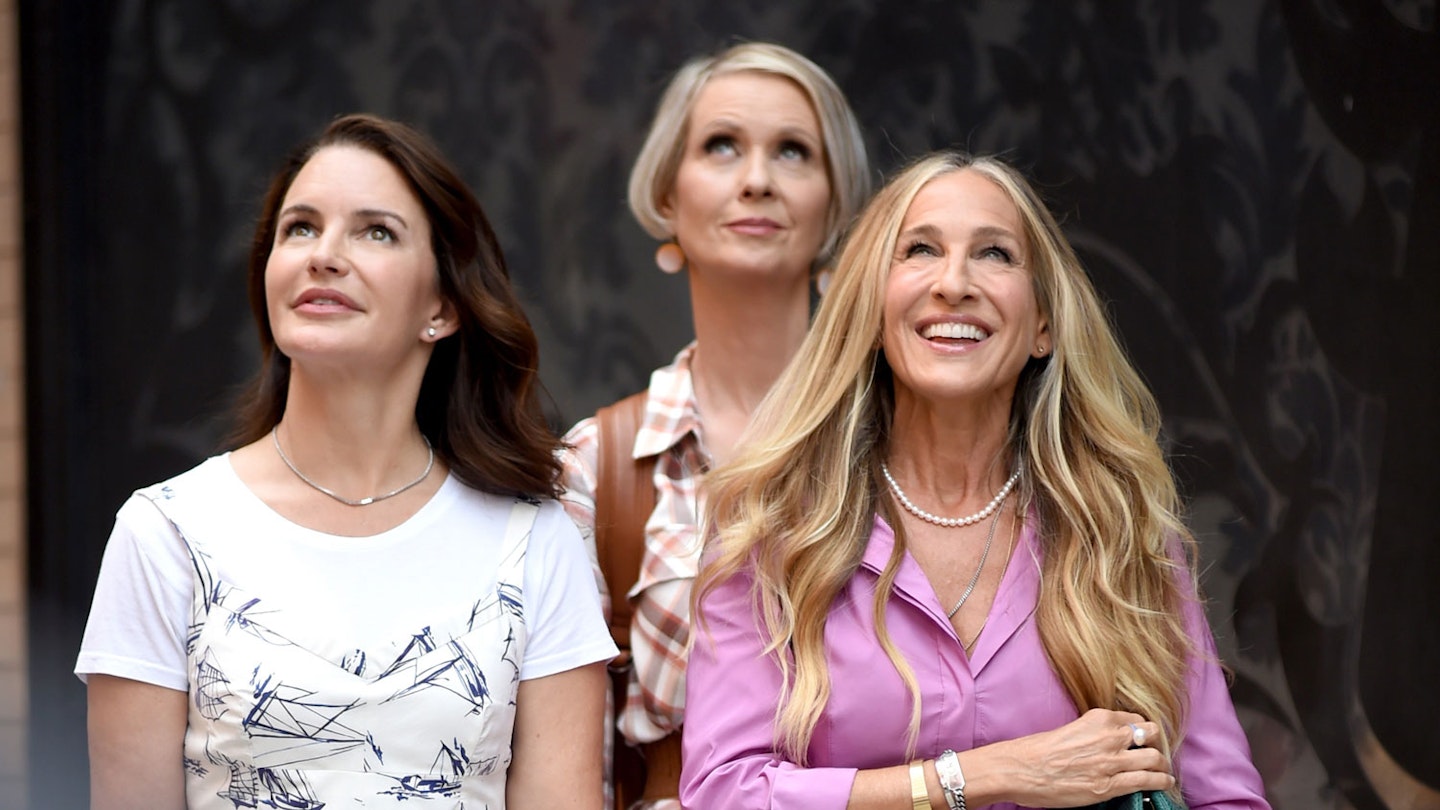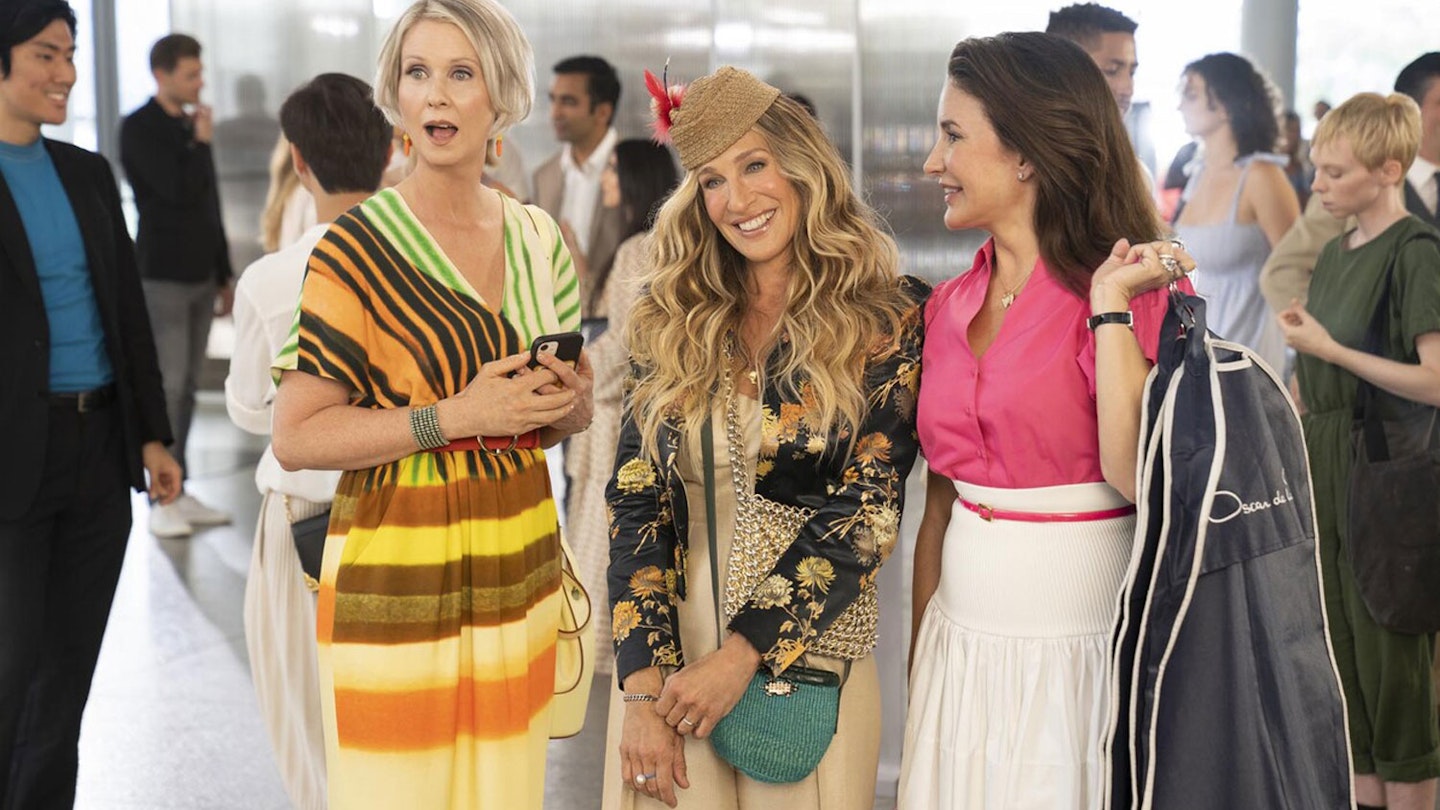Streaming on: Sky Comedy / NOW
Episodes watched: 2 of 10
Sometimes it’s about what you’ve got to lose. And there’s a real sense that there was little, if anything, to lose with And Just Like That. The original Sex And The City TV show’s neat, largely satisfactory finale in 2004 had, after all, been forever sullied by the two movies that followed (the first, with some redeeming qualities, the second a crime against cinema).
We hadn’t left Carrie Bradshaw cryogenically frozen in that final scene seventeen years ago, walking down a Manhattan street as ‘You’ve Got The Love’ powered home the show’s primary message (romantic love wasn’t the thing: loving yourself was, with friendship a close second). For instead, the films had re-tangled storylines, erased conclusions, and taken a dump on others from a great height. In fact, when we last saw Carrie, she’d fallen so out of love with herself and her own dignity that, after Big bought her a big telly instead of a rock, she cheated on him with (a very married-with-kids) Aidan.
So, yes, you can absolutely see why Michael Patrick King (on showrunning and writing duties again) and Parker, Davis and Nixon thought it worth the risk. The only way was up, right? And what better to scrape the taste of Sex And The City 2 off our tongues than a return to the original format (TV) and – fingers crossed – a return to the show’s signature bite and boldness. That would have been great! But we have been served something far more unpalatable.
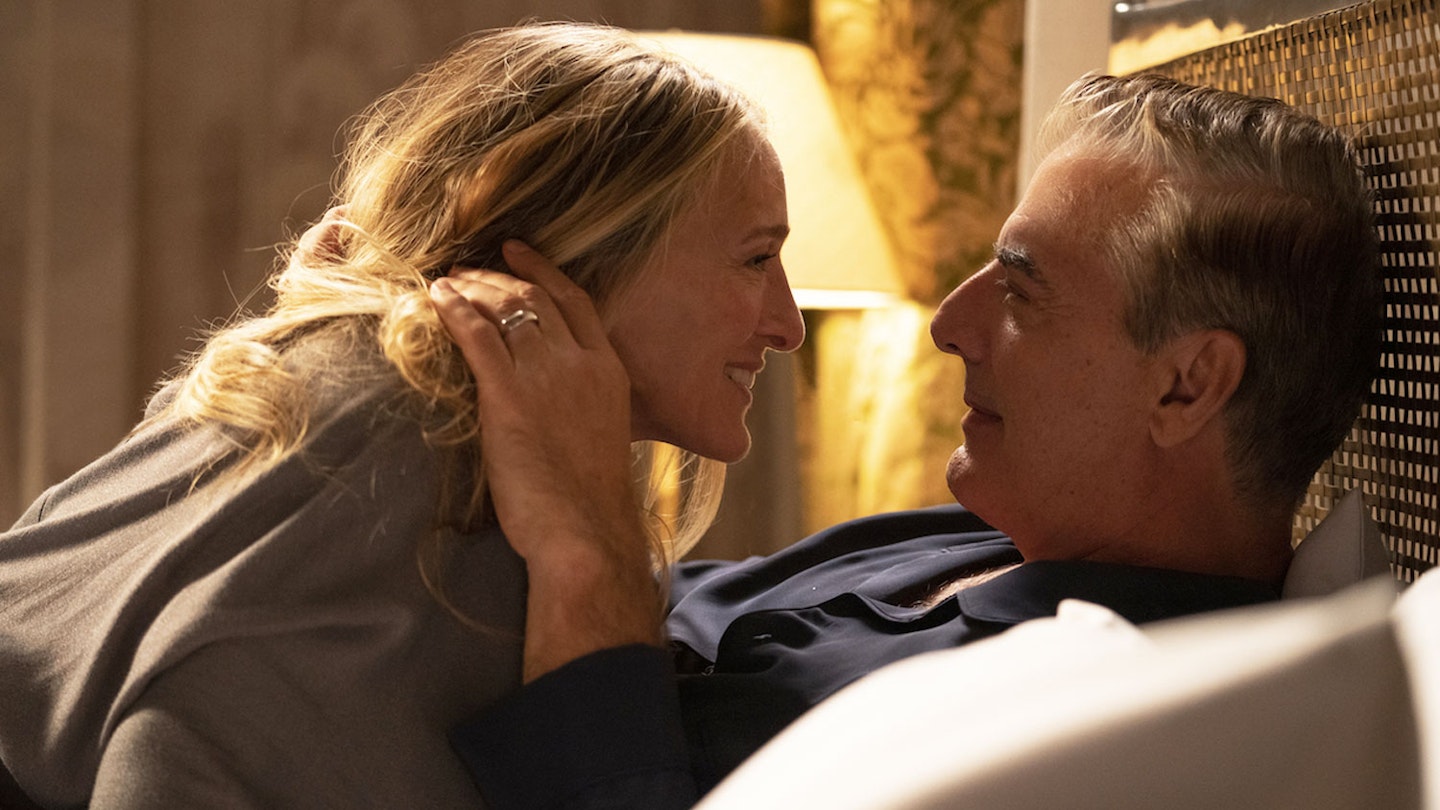
Episode 1 opens (with a bucket of exposition) in a restaurant – a simple, smart framing device given that many of the show’s most iconic, important conversations (Miranda revealing her pregnancy to a reproductively-challenged Charlotte; Charlotte’s adoption of Lily; the women agreeing to be each other’s soulmates) happened huddled around a table, over plates. Only then, there were four. And now, there are three.
It’s been well-documented that Kim Cattrall declined to return as Samantha Jones, and while there’s no poignant empty chair (Charlotte places Oscar de la Renta bags on it), her absence isn’t so easy to cover. There are flashes of the original chemistry and spark (a condom half-full joke from Carrie right out of the gate), but it’s dimmed, a beat missed. And this is only amplified when they have The Samantha Conversation. There was likely no elegant way to write Samantha Jones out, but what mattered most, for a loss so central, was believability. We learn that after being let go as Carrie’s book publicist, Samantha was so “embarrassed” she fled to London, ghosting all three of her best friends in the process.
Hang the fuck on (‘fuck’ in tribute to Samantha): Samantha Jones, a decade older than her three friends, and always more secure in her skin and self, was so mortified that her best mate dropped her from a tiny PR gig (when she ran her own successful firm), that she not only left the country but also the women she’d devoted herself to for decades?
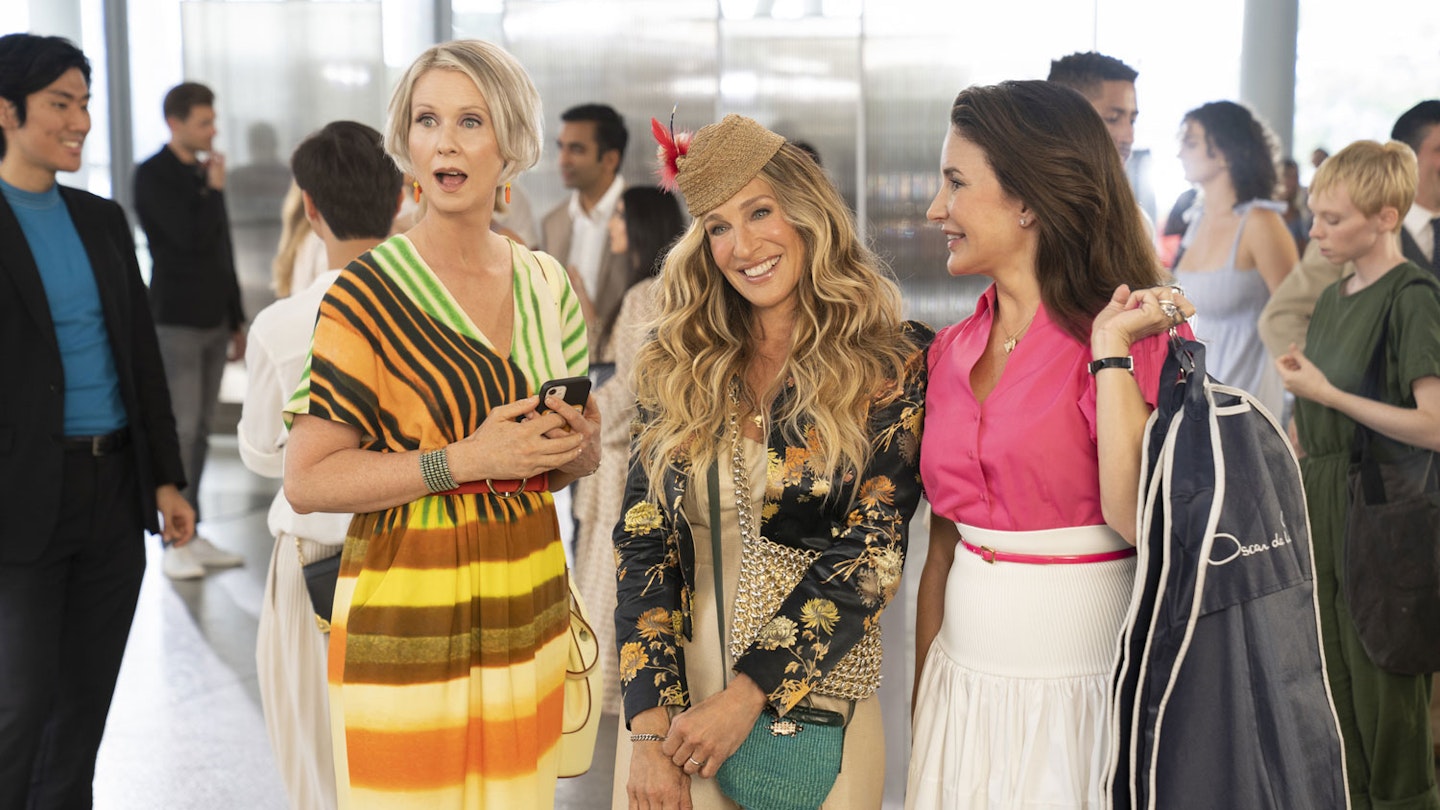
Over six seasons and two films, Samantha Jones was written as an intensely loving, loyal-to-the-end friend, especially to Carrie. The one major blow-up they had – after Carrie walked in on Samantha giving a blow-job to the Worldwide Express guy in season five – ended with Carrie apologising and Samantha responding: “I don’t want to do the ‘I’m sorry’ stuff with you. Anyone else, but not you. You and I are perfect.” Carrie was the first person Samantha told about her breast cancer diagnosis; she dropped everything when Big left Carrie at the altar. This is who Samantha Jones is – or rather, thanks to And Just Like That, was.
The real kick in the nuts? Carrie saying, “I thought I was more to her than an ATM”. Reports abounded for years that Cattrall fought on financial grounds, so yeah, elegant it most certainly ain’t. Believable it most certainly ain’t either.
The joy and verve we remember is but a faint echo, lost to time.
And that’s not the end of the problems with characterisation – consistent, recognisable characterisation. If anything, these characters are most reminiscent of the crass outlines drawn by those naysayers who haven’t seen the show, yet still hate it. Frankly, you couldn’t pick most of them out of a line-up, apart from Big (Chris Noth), who adds a shot of familiar levity, lightness and (yes) sexiness. Charlotte, now mother of two teenagers, is a self-centred Stepford Wife on steroids, without any of the self-awareness or humour she developed in later seasons. Carrie is a squeamish, supremely uptight and tongue-tied podcaster and Instagrammer. Stanford (much-missed Willie Garson), always a truly delightful bitch, is now downright cruel. Miranda, having left corporate law to get a Masters in Human Rights Law, is no longer steadfast, smart and logical but a flaky, bumbling, tangle of neurosis. She’s also the focus of some of the show’s most excruciating attempts to navigate the modern world, and specifically issues of gender, race and sexuality (“I wasn’t sure if that was a white saviour moment!”).
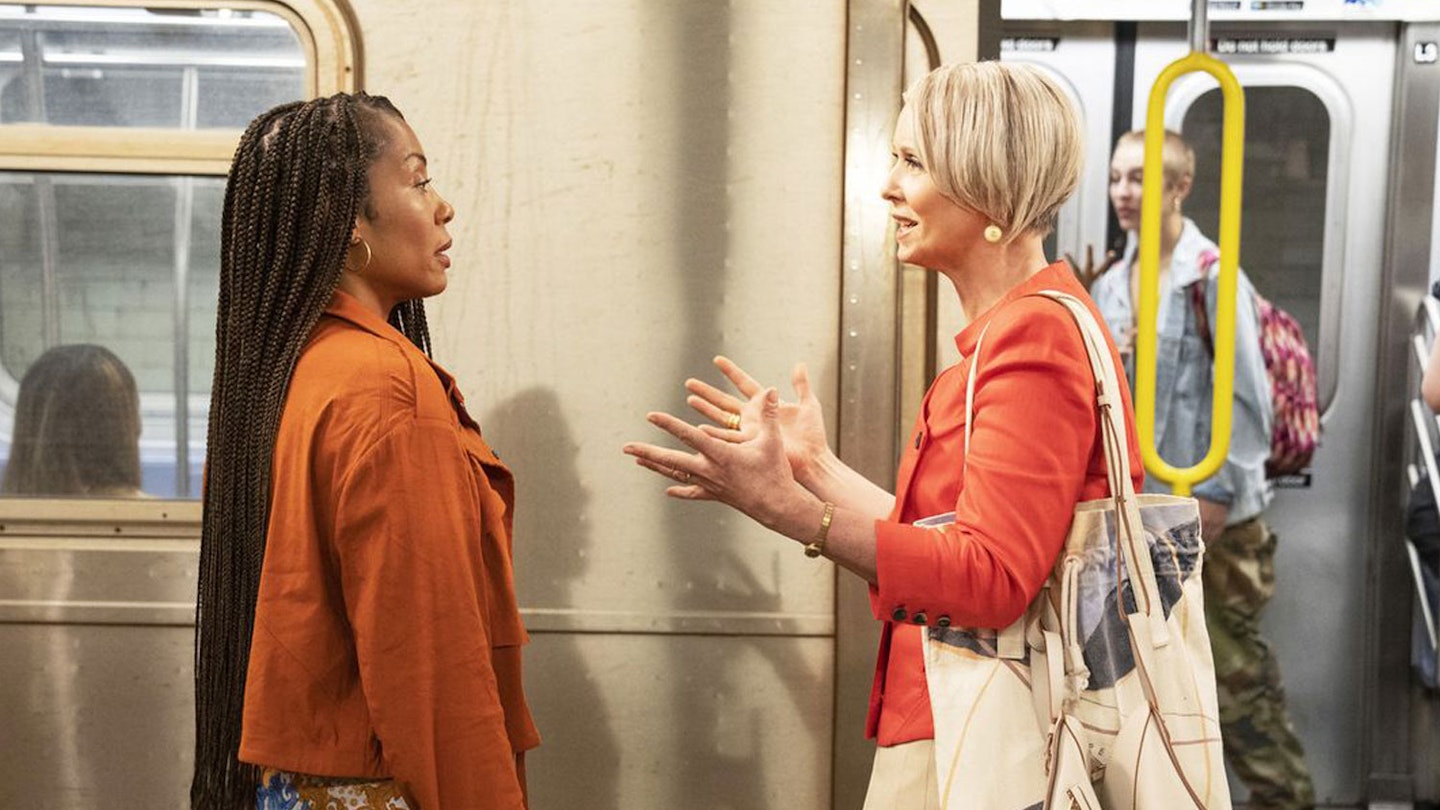
This is the show’s biggest struggle, after the original was latterly criticised for its all-white, entirely-privileged, what-is-intersection-again point of view. Of course, And Just Like That couldn’t – shouldn’t – replicate that world, but the attempts to paint a rich, real, diverse world are ham-fisted, inauthentic and riddled with self-consciousness, awkwardness and moments of self-congratulation.
To help them navigate the world, to teach them “lessons”, each one of the trio is paired with a character of colour. For Carrie, it’s “queer non-binary Mexican-Irish diva” podcast boss Che (played with pluck and charm by Sara Ramirez); for Miranda, it’s professor Dr Nya Wallace (Karen Pittman); and for Charlotte, a fellow Park Avenue mom, Lisa (Nicole Ari Parker) or as Anthony calls her “the Black Charlotte”. And therein lies a major problem: they’re positioned as non-white, non-straight mirror images of these women. Which aside from being reductive, seems like an easy ‘solution’ to the show’s previous flaws and one which relies on these characters doing the work of educating Carrie, Charlotte and Miranda.
These women – who were in some respects progressive in their tracking of social and sexual happenings in New York – are now not only tone-deaf but also horrendously out of touch. Hey, the show suggests, this is just what happens after 50! In fact, most of the characters are subdued, overpowered by the ageing process. If you were hoping for a sense of the liberation that can come with (women, especially) getting older, or even a cursory look at the changing relationship with visibility and societal expectation, you’ll be disappointed (and no, a conversation about Miranda colouring her hair doesn’t count).
The tone is nigh-on elegiac, which is appropriate for certain plotlines (including a major occurrence at the end of the first episode which we shan’t spoil), but one that also permeates the entire show. Sex And The City could always do gravity as well as any drama, but it was also sharp, often satirical and funny – god, oh so funny. And perhaps even more importantly, fun. Sadly, the few attempts to recapture that fall flat, and the joy and verve we remember is but a faint echo, lost to time.
So, as it turns out, there was something left to lose: the hope, the warming thought that out there, striding down Manhattan streets, three fifty-something women (and their sixty-something friend) were still living lives of love, friendship, laughter and fun.
